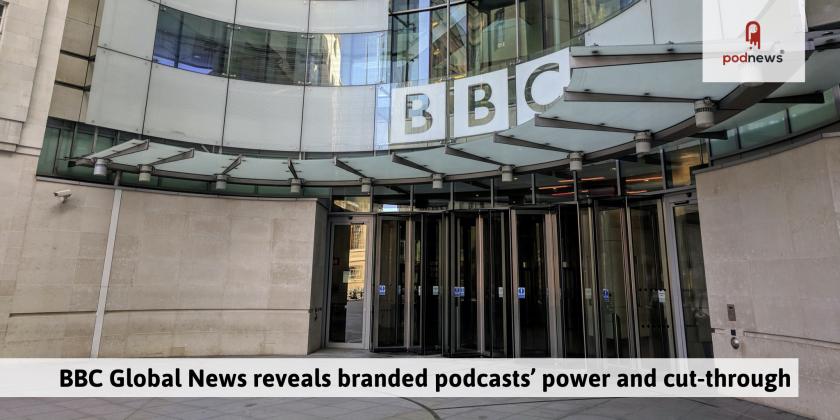
Audio: Activated - the power of branded podcasts
This article is at least a year old
Branded podcasts are an effective means of advertising and a powerful addition to the marketing mix. They generate real cut-through with audiences – particularly ad avoiders. In addition, their impact increases when the listener is engaged in other tasks, which is true for 94% of podcast listeners, and therefore represents an entirely separate space for brands to reach their audiences. These are among the findings of Audio: Activated, a new study from BBC Global News’s branded content division – and carried out across four continents by neuroscience researchers at Neuro-Insight. It researches the minds of audio listeners to discover the unique benefits of this space for brands.
Using cutting-edge neuroscience methods, measuring second-by-second brain activity as content is consumed in passive and active states of activity, Audio: Activated reveals the persuasive power and cut-through of branded podcasts. Podcasts have a huge and growing audience. More than 30% of all adult Americans now listen to podcasts at least monthly – that’s more than 90 million people¹. In a field filled more with excitement than reliable research data, this study provides much-needed insight.
The study’s key findings include:
Branding stands out from the content, helping land the message
Within branded podcasts, the brand stands out from the content. Brand mentions in the podcast deliver on average 16% higher engagement and 12% higher memory encoding than the surrounding content. This is a unique effect, as global radio benchmarks show that brand mentions on average score 5% lower than content. The intimate and conversational nature of the podcast environment creates an elevated state of engagement for brand mentions. This also drives brand metrics across the board, helping to generate lifts in awareness (↑89%), brand consideration (↑57%), brand favorability (↑24%), and purchase intent (↑14%).
Branded podcasts achieve unique cut-through with ad avoiders
The study’s sample was comprised of ad avoiders, but their engagement, emotional intensity and memory encoding around brand mentions beat TV benchmarks by at least 22%², showing that branded podcasts are an effective way to engage this hard to reach but commercially-desirable group.
Podcast listeners are active
94% of listeners consume podcasts while performing other tasks. Doing chores at home (61%) and driving (55%) were the most common, with exercising, shopping and running errands also popular.
Activity makes listeners more receptive
Rather than reducing the brand impact, the research shows that the active group scored more highly on all measures - engagement (+18%), emotional intensity (+40%) and long term memory of the podcast (+22%).
The study shows that two processes occur in order to deliver this:
-
Keeping the brain occupied with an activity enhances the ability for brands messages to achieve cut-through.
-
The state of activity means that the podcast content is being taken in through ‘low-involvement processing’ - a much more ‘fuel-efficient’ process that has a lower cognitive load. As such, engagement with the content can last much longer; good news for this long-form format.
Branded podcasts drive positive associations
Listeners create subconscious associations with the brand, based on words they hear in the podcast. In our sample, the word “innovative” was mentioned 12 times during the podcast. Listeners were later more likely to call the sponsor “innovative”, showing that they instinctively associate the brand with the message.
Podcasts provide extra time for brands
When people are listening to podcasts, they are doing so in moments that are not traditionally opportunities for advertising. Because of the unique way podcasts are consumed – usually whilst multitasking – brands are now able to reach people in what were previously thought to be unreachable moments. This is an enviable commercial opportunity as it is additive to the marketing mix.
Richard Pattinson, SVP BBC StoryWorks, says, “The BBC has a near-century long reputation for excellence in audio-based storytelling. This study provides real empirical evidence demonstrating the opportunity in the audio space for brands, and partnering with experts in this space offers an exciting and effective way for them to reach audiences in a genuinely meaningful way. ”
1 SOURCE: Infinite Dial 2019
2 SOURCE: Neuro-Insight Benchmarks, 2001 – 2019
Methodology
Audio: Activated worked with 2,448 global respondents in 10 markets around the world. This included 1,844 consumer surveys, 27 deep dive video diaries, and 14 in-depth video interviews with experts around the world. For the neuroscience portion, the BBC worked with subjects who are regular podcast listeners, finance enthusiasts with USD 100k+ combined annual household income, and are ad avoiders in four markets: New York, Melbourne, Munich and Singapore. We measured emotional intensity, long-term memory encoding and cognitive engagement using Steady State Topography (SST) when exposed to 30 min finance branded finance podcast Money Movement.
BBC World News and BBC.com, the BBC’s commercially funded international 24-hour English news platforms, are owned and operated by BBC Global News. BBC World News television is available in more than 200 countries and territories worldwide, and over 465 million households and 3 million hotel rooms. The channel’s content is also available on 178 cruise ships, 53 airlines, including 13 distributing the channel live inflight, and 23 mobile phone networks. BBC.com offers up-to-the-minute international news, in-depth analysis and features, including BBC Worklife, BBC Culture, BBC Future, BBC Travel and BBC Reel, for PCs, tablets and mobile devices to more than 110 million unique browsers each month.
This is a press release which we link to from Podnews, our daily newsletter about podcasting and on-demand. We may make small edits for editorial reasons.